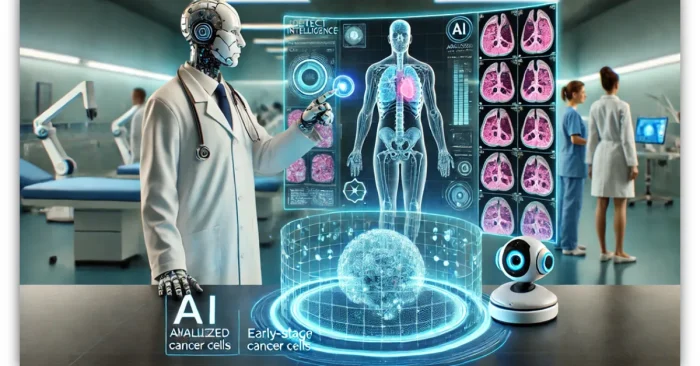Overview
AI tools for cancer detection are transforming the way medical professionals diagnose and treat cancer by providing faster, more accurate, and non-invasive methods of analysis. These systems use advanced algorithms, deep learning, and medical imaging technologies to identify abnormal cells, tumors, and early signs of cancer that may be overlooked by the human eye.
By analyzing medical images, genetic data, and pathology slides, AI can assist in early detection, reducing misdiagnosis, and guiding personalized treatment plans. The integration of AI in oncology not only improves diagnostic accuracy but also speeds up the process, helping doctors make informed decisions and saving patients valuable time. With continuous learning, these tools adapt to new datasets, becoming more effective over time in improving patient outcomes.
1. IBM Watson for Oncology – AI-Powered Cancer Diagnostics
IBM Watson for Oncology uses natural language processing and machine learning to analyze patient data, medical images, and research papers. It provides oncologists with evidence-based treatment options, helping improve diagnostic accuracy and patient care. Its AI engine processes huge datasets to detect patterns and suggest personalized therapies.
2. PathAI – Precision Pathology for Cancer Detection
PathAI specializes in analyzing pathology slides with deep learning models. It identifies abnormal tissue samples, supports early cancer diagnosis, and minimizes errors in lab interpretations. Its continuous learning system improves diagnostic precision, making it a trusted assistant for pathologists worldwide.
3. Tempus – AI for Genomic and Clinical Data
Tempus uses AI to combine genomic sequencing with clinical data. By analyzing patient DNA and medical records, Tempus helps doctors predict cancer risk, select targeted therapies, and optimize treatment outcomes. The tool is especially strong in personalized oncology care.
4. Zebra Medical Vision – AI Radiology Cancer Detection
Zebra Medical Vision provides AI-based radiology tools that detect early signs of cancer from CT scans, MRIs, and X-rays. Its algorithms are trained on millions of images, enabling accurate detection of lung, breast, and liver cancers. Hospitals use it to reduce workload and improve diagnostic accuracy.
5. Freenome – AI for Blood-Based Cancer Screening
Freenome uses AI and machine learning to analyze blood samples for early cancer detection. By studying cell-free DNA (cfDNA) and other biomarkers, it identifies patterns associated with cancer. Its goal is to detect cancers at early, more treatable stages through non-invasive tests.
6. Paige.AI – Digital Pathology for Cancer Diagnosis
Paige.AI provides AI-powered pathology solutions to detect prostate, breast, and other cancers. It analyzes digitized pathology slides and highlights suspicious regions for pathologists, reducing oversight errors. The system also helps in training new diagnostic models across cancer types.
7. Arterys – AI in Medical Imaging
Arterys uses cloud-based AI tools for radiology and oncology. Its algorithms help detect tumors and analyze cancer progression in CT and MRI scans. Physicians benefit from faster image interpretations, collaborative workflows, and accurate cancer tracking over time.
8. Microsoft InnerEye – AI for Radiotherapy Planning
Microsoft InnerEye focuses on segmenting tumors in radiology scans. It helps oncologists plan radiation therapy more effectively by identifying tumor boundaries. The AI reduces manual workload and ensures precise targeting, improving treatment accuracy for cancer patients.
9. Lunit INSIGHT – AI Cancer Imaging Tool
Lunit INSIGHT provides AI solutions for chest X-rays and mammograms to detect lung cancer and breast cancer at early stages. Its AI models have been trained on millions of images, achieving high accuracy and supporting radiologists in clinical decision-making.
10. QuantX – FDA-Approved AI Diagnostic Aid
QuantX is one of the first FDA-approved AI platforms for cancer detection. It helps radiologists evaluate breast MRI scans by providing quantitative analysis. With decision-support features, it increases diagnostic confidence and reduces variability in cancer interpretation.
(FAQs)
Q1: How do AI cancer detection tools improve diagnosis?
They analyze medical images, genetic data, and pathology slides with deep learning to identify tumors and cancer patterns that may be overlooked by humans, improving accuracy and early detection.
Q2: Are AI cancer detection tools reliable?
Yes, most tools are trained on millions of datasets and continuously improve through machine learning. They are designed to assist doctors, not replace them, ensuring safer and more accurate diagnosis.
Q3: Can AI tools detect cancer at early stages?
Yes, many tools like Freenome and Lunit INSIGHT specialize in early cancer detection by analyzing biomarkers, imaging data, and subtle changes that may indicate early disease development.
Learn More About AI Course https://buhave.com/courses/learn/ai/






